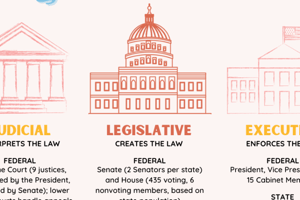Podcast
Questions and Answers
The legislature branch is responsible for interpreting existing laws.
The legislature branch is responsible for interpreting existing laws.
False (B)
The president of the United States has the power to veto bills.
The president of the United States has the power to veto bills.
True (A)
Civil service is one of the branches of government responsible for enforcing laws through courts.
Civil service is one of the branches of government responsible for enforcing laws through courts.
False (B)
Judges are always elected in every country's judicial branch.
Judges are always elected in every country's judicial branch.
The executive branch is responsible for managing foreign affairs.
The executive branch is responsible for managing foreign affairs.
In the legislature branch, laws are made by appointed representatives.
In the legislature branch, laws are made by appointed representatives.
Flashcards are hidden until you start studying
Study Notes
Government is organized into several branches which work together to create laws, enforce them through courts, collect taxes, protect citizens, and manage foreign affairs. These branches can vary by country, but typically include legislature, executive, judiciary, civil service, and sometimes military branches. Let's take a closer look at each of these branches.
Legislature
The legislature branch makes the laws in a government. It consists of elected representatives who act on behalf of their constituents, passing new laws and amending old ones. For example, Congress makes and passes federal laws for the United States. This branch ensures that the people have a say in what becomes law and how it gets enforced.
Executive Branch
This branch puts the laws into action. The president of the United States, for instance, works with Congress to make sure that laws get passed and followed. The president also has powers like vetoing bills and making treaties with other countries. In many governments, this power is held by one person called a Prime Minister.
Judicial Branch
Courts and judges form the third branch of government. They interpret existing laws when there is a dispute between parties. Courts must decide if someone broke a rule or law, and they do so based on evidence presented during legal hearings. In some countries, judges are appointed while others are elected. Some examples of types of court cases could involve criminal actions, family disputes, property rights, and more.
Civil Service
In most countries, the government needs help carrying out its duties, such as collecting taxes. That’s where the civil service comes in. Workers within the civil service carry out day-to-day tasks required by public agencies. They support all three branches of government, keeping everything running smoothly behind the scenes.
Military Branch
Military forces exist to protect a nation from threats both inside and outside its borders. Many nations have large standing armies that defend against attacks from enemies. Other countries rely on reserve units to supplement active duty forces. Overall, militaries keep citizens safe from harm.
Each branch plays its own role in maintaining order and functioning of society. Together, they ensure smooth governance and stability.
Studying That Suits You
Use AI to generate personalized quizzes and flashcards to suit your learning preferences.




